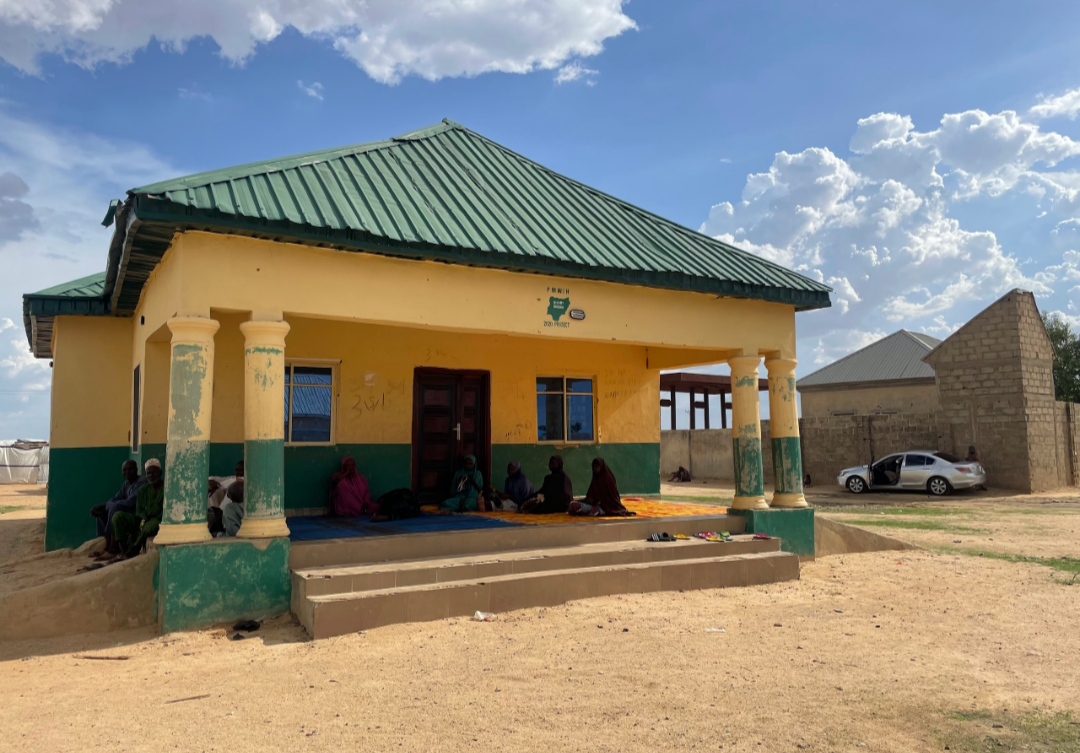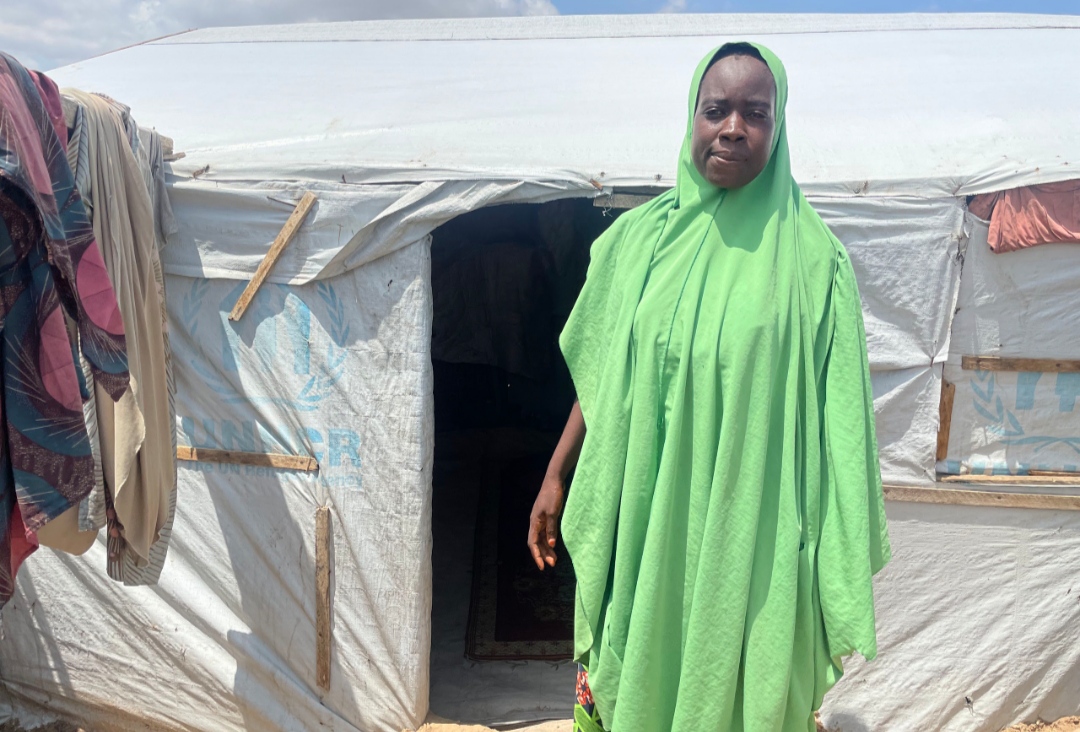[ad_1]
After a long day selling firewood, sleep eluded Khadija Musa. Her head throbbed and her temperature rose throughout the night.
The next morning, the 28-year-old resident of one of the 500 housing units built by the state government for resettled internally displaced persons (IDPs) in Auno, Konduga Local Government Area of Borno State went to the primary healthcare centre (PHC) In the council’s headquarters.
Going by the publicised plan of the state government’s resettlement exercise for IDPs, Ms Musa should only have walked a few blocks before getting to a PHC.

But the PHC standing on the first row of homes at her resettlement community has not been opened since it was completed about a year ago, residents said. That has forced the residents to turn to the PHC in a neighbouring community, resulting in overcrowding at a facility that was already stretched to the limit.
A PHC should serve between 10,000 and 20,000 patients, according to Nigeria’s Minimum Standards for Primary Health Care
Even before the arrival of the newly resettled 500 households, Auno PHC had 14,700 people to serve, Zanna Shariff, who heads the facility, said.
The distance between the resettlement area and the Auno PHC also encourages self-medication as many former IDPs prefer to patronise any nearby drugstore instead of travelling to the PHC lying many kilometres away.
Ms Musa, for instance, said she had used paracetamol for many days before deciding to go to Auno PHC after her condition persisted.
But at the centre, there was no doctor to attend to her. The nurse on duty told her she had Malaria, a common ailment that she had also suspected.

“When I got to the hospital in Auno, they gave me drugs for Malaria and Typhoid,” she said. “I continued taking the drugs but it kept getting worse.”
A few days later, her family took her to the Umaru Shehu General Hospital in Maiduguri, 19 kilometres away, where she was placed on admission for two weeks.
Displeased residents, overwhelmed facility
But Auno residents are also concerned. The arrival of the former IDPs has narrowed their access to healthcare services as their PHC now has more patients to attend to every day.
“Since they brought the IDPs, there’s always a long queue,” Maryam Abba, a 30-year-old mother of five, said in frustration. “Even when drugs are available, you have to wait longer because the staff are not many.”
Aishatu Idris, 29, wished the resettled IDPs had their own hospital so that they would not have to overcrowd “our own.”
“The population is now high. You get to the hospital and find out there are no drugs,” she said.
What she didn’t know is that a PHC had been built for the former IDPs but has remained unopened.
Mr Shariff, the Auno PHC head, said the facility has a manpower shortage, a problem that the addition of over 500 households to the existing 14,700 individuals has compounded.


The Primary Health Care Centre, Shuwari, is visible from the entrance of the Shuwar settlement. The PHC was built as part of the blocks of houses built for displaced residents and is currently being managed by the Alliance for International Medical Action (ALIMA), a Dakar-based medical humanitarian organisation.
A nutritionist at the facility, Zarah Bako, said the facility handles outpatient department (OPD) consultation, antenatal care, child delivery, nutrition, and routine immunisation.
She listed the manpower resources of the PHC including three Community Health Extension Workers (CHEW), two nurses, two midwives, one clinician and one pharmacist.
However, on a Wednesday, just before 2 p.m. when PREMIUM TIMES visited the facility, only two health workers were on duty – Ms Bako and Aishatu Abba, a midwife assistant.
“We close by 1 p.m. due to the insurgency – sometimes there are attacks nearby not more than 3 to 4 kilometres away. So we close by 1 p.m. so as to get a tricycle to go back to town (Maiduguri). But the normal time for closing is 3 p.m.,” Mrs Bako said.
PREMIUM TIMES visited again on a Sunday around 9 a.m. but the facility was shut, confirming what the residents said about the hospital operating only on weekdays.
What this means is that an emergency beyond 2 p.m. cannot get any attention. It also means that patients cannot be admitted to the facility as the workers do not work beyond noon.
When asked about the water supply in the facility, Ms Bako said they use a generator to power the water pump that extracts water into the PHC’s water reservoir.
For electricity, she said the facility uses a generator from 10 a.m. until 1 p.m. when they close for the day.
“No solar, no electricity,” she said.
Many residents of the resettlement community expressed satisfaction with the services they get which include free consultation and drugs. But some of them raised concerns.
Yagana Ali, 38, said she doesn’t visit the health centre anymore despite it being a few steps away from her residence just behind Shuwari resettlement. Her decision was due to what she described as the rationing of drugs at the centre.

“They don’t give enough drugs,” she claimed. “They may write a one-week dosage for a drug for you but they will only give you the dosage daily, asking you to come back when it’s finished.”
She said she once had a skin condition that required her to use Miconazole cream on her body from time to time.
“But they only fetch Miconazole cream in nylon for me. How will that work? Are they not supposed to give me the complete tube?” she queried.
Similarly, Bukar Bulama, 60, said the hospital always gives drugs even when they would prefer injections.
“We prefer injections. There are no injections, they always give drugs. Injections work faster,” he said even though he has no medical or pharmaceutical competence.
However, a midwife assistant at the facility, Aishatu Abba, said the facility was no longer getting many supplies, prompting it to ration what is available.
“We used to get some supplies that we give to women. For instance, when they come for antenatal we give them mosquito nets and detergents to wash their clothes and when they deliver babies at the centre, we give them ‘mama kits’. But since we don’t have supplies anymore, the attendance has dropped.”
‘We will look into it,’ government responds
When contacted, Governor Babagana Zulum’s spokesperson, Isa Gusau, said the government’s resettlement exercise prioritises the provision of healthcare centres in all the resettled communities.
He said the government has standing committees in the resettled communities and gets almost weekly briefings from them.
“The first thing before any resettlement exercise, the government ensures that the place is safe and then puts in place basic amenities like water, healthcare centre, school and means of livelihood,” he said in a telephone interview.
“We have some standing committees that were established for the purpose of monitoring the progress of post-settlement in all the communities that have been resettled…The government directed them that all of them must be on the ground where people are settled. So the government gets almost weekly briefings on what is happening just to ensure that life is picking up.”
Mr Gusau, however, said he was unaware of the situation in some of these health centres.
The governor’s aide asked our reporter to send him the location of some of the findings and promised to pass them on to the appropriate officials.
“I will contact the relevant officials in charge of health to know what the problem is. I don’t know about the community, so I will contact either the permanent secretary of health to find out what the problem is,” he said.
Qosim Suleiman is a reporter at Premium Times in partnership with Report for the World, which matches local newsrooms with talented emerging journalists to report on under-covered issues around the globe.
Support PREMIUM TIMES’ journalism of integrity and credibility
Good journalism costs a lot of money. Yet only good journalism can ensure the possibility of a good society, an accountable democracy, and a transparent government.
For continued free access to the best investigative journalism in the country we ask you to consider making a modest support to this noble endeavour.
By contributing to PREMIUM TIMES, you are helping to sustain a journalism of relevance and ensuring it remains free and available to all.
Donate
TEXT AD: Call Willie – +2348098788999
[ad_2]
Source link








